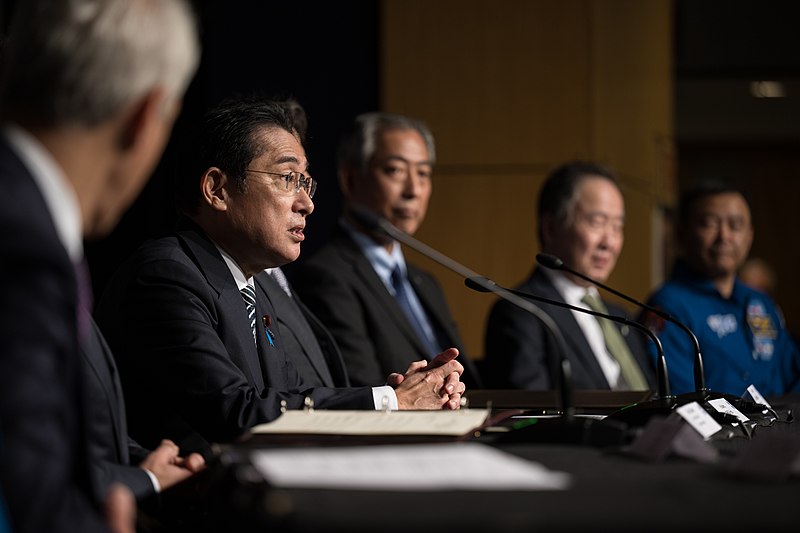Japanese Prime Minister Fumio Kishida said that the Japanese government would continue to demand that China release an employee of Astellas Pharma that it has detained. The demand comes amidst fears over the safety of China’s business environment.
Kishida told an Upper House budget committee meeting on Monday that the government will continue to demand that Beijing release the Astellas Pharma employee. Kishida added that the government also asked for consular visits with the detained national and would provide support, including contact with family. This follows Japanese foreign minister Yoshimasa Hayashi’s meeting with his Chinese counterpart on Sunday, urging Beijing to release the detained Japanese national.
The Japanese foreign ministry said that Tokyo has yet to hear from China on an explanation for the Japanese national’s detention. China has said it will approach the situation “according to the law” in response to Hayashi’s comments. The employee that was detained has worked in China for over 20 years, according to Japan’s Nikkei Daily.
The Yomiuri news outlet described the detained national as an “Astellas executive.”
A Japanese expatriate told Reuters that the lack of an explanation regarding the detention has concerned Japanese business people. They said that Japanese businesses in China in recent years have had difficulty in navigating the transfers of data, such as production data from their factories across borders under the National Security Law, as it was a legal gray area.
Astellas confirmed to Reuters that its employee was detained in China but did not disclose further details of the man or his detainment.
Friday last week, the Japanese Economy, Trade, and Industry Ministry announced that it was imposing export controls on six categories of equipment used in manufacturing chips. While it did not directly mention China, it said equipment makers would need to seek export permission for all regions.
“We are fulfilling our responsibility as a technological nation to contribute to international peace and stability,” said the ministry, adding that it is aiming to stop advanced technology from being used for military purposes.
The export restrictions will take effect in July and follow the move by the United States to impose sweeping restrictions on chipmaking tool exports to China back in October. Washington cited concerns that Beijing plans to use advanced semiconductors to boost its military capabilities.



 U.S.-India Trade Framework Signals Major Shift in Tariffs, Energy, and Supply Chains
U.S.-India Trade Framework Signals Major Shift in Tariffs, Energy, and Supply Chains  Trump Allegedly Sought Airport, Penn Station Renaming in Exchange for Hudson River Tunnel Funding
Trump Allegedly Sought Airport, Penn Station Renaming in Exchange for Hudson River Tunnel Funding  China Warns US Arms Sales to Taiwan Could Disrupt Trump’s Planned Visit
China Warns US Arms Sales to Taiwan Could Disrupt Trump’s Planned Visit  Netanyahu to Meet Trump in Washington as Iran Nuclear Talks Intensify
Netanyahu to Meet Trump in Washington as Iran Nuclear Talks Intensify  Trump Says “Very Good Talks” Underway on Russia-Ukraine War as Peace Efforts Continue
Trump Says “Very Good Talks” Underway on Russia-Ukraine War as Peace Efforts Continue  Nighttime Shelling Causes Serious Damage in Russia’s Belgorod Region Near Ukraine Border
Nighttime Shelling Causes Serious Damage in Russia’s Belgorod Region Near Ukraine Border  Iran–U.S. Nuclear Talks in Oman Face Major Hurdles Amid Rising Regional Tensions
Iran–U.S. Nuclear Talks in Oman Face Major Hurdles Amid Rising Regional Tensions  India–U.S. Interim Trade Pact Cuts Auto Tariffs but Leaves Tesla Out
India–U.S. Interim Trade Pact Cuts Auto Tariffs but Leaves Tesla Out  New York Legalizes Medical Aid in Dying for Terminally Ill Patients
New York Legalizes Medical Aid in Dying for Terminally Ill Patients  Trump Signs “America First Arms Transfer Strategy” to Prioritize U.S. Weapons Sales
Trump Signs “America First Arms Transfer Strategy” to Prioritize U.S. Weapons Sales  Japan Election 2026: Sanae Takaichi Poised for Landslide Win Despite Record Snowfall
Japan Election 2026: Sanae Takaichi Poised for Landslide Win Despite Record Snowfall  Missouri Judge Dismisses Lawsuit Challenging Starbucks’ Diversity and Inclusion Policies
Missouri Judge Dismisses Lawsuit Challenging Starbucks’ Diversity and Inclusion Policies  Ohio Man Indicted for Alleged Threat Against Vice President JD Vance, Faces Additional Federal Charges
Ohio Man Indicted for Alleged Threat Against Vice President JD Vance, Faces Additional Federal Charges  Trump Lifts 25% Tariff on Indian Goods in Strategic U.S.–India Trade and Energy Deal
Trump Lifts 25% Tariff on Indian Goods in Strategic U.S.–India Trade and Energy Deal  Trump Endorses Japan’s Sanae Takaichi Ahead of Crucial Election Amid Market and China Tensions
Trump Endorses Japan’s Sanae Takaichi Ahead of Crucial Election Amid Market and China Tensions  Trump Backs Nexstar–Tegna Merger Amid Shifting U.S. Media Landscape
Trump Backs Nexstar–Tegna Merger Amid Shifting U.S. Media Landscape 































